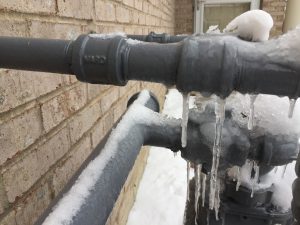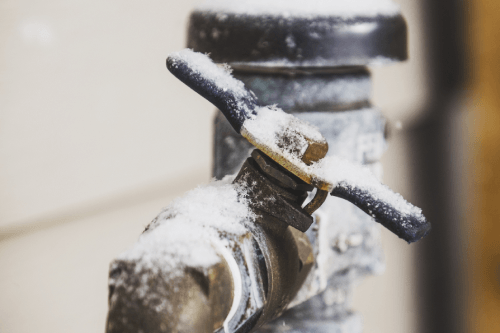Ways to Maintain Pipes from Cold Weather Damage: Essential Tips
Ways to Maintain Pipes from Cold Weather Damage: Essential Tips
Blog Article
The content following next pertaining to How to Prevent Your Pipes From Freezing is incredibly captivating. Read it yourself and see what you think about it.

Cold weather can wreak havoc on your pipes, specifically by freezing pipelines. Right here's exactly how to avoid it from taking place and what to do if it does.
Intro
As temperatures drop, the danger of frozen pipelines increases, potentially causing pricey fixings and water damages. Recognizing how to prevent frozen pipes is essential for property owners in cold climates.
Prevention Tips
Shielding at risk pipelines
Cover pipes in insulation sleeves or use heat tape to protect them from freezing temperature levels. Concentrate on pipes in unheated or exterior locations of the home.
Heating techniques
Keep indoor areas effectively heated up, especially locations with plumbing. Open up cabinet doors to enable warm air to distribute around pipes under sinks.
How to determine icy pipelines
Look for decreased water flow from taps, unusual odors or noises from pipelines, and noticeable frost on exposed pipes.
Long-Term Solutions
Structural changes
Take into consideration rerouting pipes far from outside wall surfaces or unheated locations. Add added insulation to attics, basements, and crawl spaces.
Upgrading insulation
Buy premium insulation for pipelines, attic rooms, and wall surfaces. Appropriate insulation helps maintain regular temperature levels and minimizes the risk of frozen pipelines.
Safeguarding Exterior Plumbing
Garden hoses and exterior taps
Disconnect and drain garden pipes prior to winter months. Mount frost-proof faucets or cover outside taps with protected caps.
Comprehending Frozen Pipes
What creates pipelines to freeze?
Pipes ice up when exposed to temperatures listed below 32 ° F (0 ° C) for expanded periods. As water inside the pipes ices up, it broadens, putting pressure on the pipeline walls and possibly triggering them to burst.
Threats and damages
Icy pipelines can lead to water supply interruptions, residential property damage, and pricey repair work. Ruptured pipes can flood homes and create considerable architectural damage.
Indicators of Frozen Pipeline
Identifying icy pipelines early can prevent them from breaking.
What to Do If Your Pipelines Freeze
Immediate actions to take
If you think icy pipelines, keep taps open to ease stress as the ice melts. Use a hairdryer or towels taken in hot water to thaw pipes gradually.
Conclusion
Avoiding icy pipes requires positive measures and fast responses. By understanding the causes, indications, and preventive measures, homeowners can protect their plumbing during winter.
Helpful Tips to Prevent Frozen Pipes this Winter
UNDERSTANDING THE BASICS: WHY PIPES FREEZE AND WHY IT’S A PROBLEM
Water freezing inside pipes is common during the winter months, but understanding why pipes freeze, and the potential problems it can cause is crucial in preventing such incidents. This section will delve into the basics of why pipes freeze and the associated problems that may arise.
THE SCIENCE BEHIND FROZEN PIPES
When water reaches freezing temperatures, it undergoes a physical transformation and solidifies into ice. This expansion of water as it freezes is the primary reason pipes can burst. As the water inside the pipe freezes, it expands, creating immense pressure on the walls. If the pressure becomes too great, the pipe can crack or rupture, leading to leaks and water damage.
FACTORS THAT CONTRIBUTE TO PIPE FREEZING
Low Temperatures: Extremely cold weather, especially below freezing, increases the risk of pipes freezing. Uninsulated or Poorly Insulated Pipes: Pipes located in unheated areas, such as basements, crawl spaces, or attics, are more prone to freezing. Insufficient insulation or lack of insulation altogether exacerbates the problem. Exterior Wall Exposure: Pipes running along exterior walls are susceptible to freezing as they encounter colder temperatures outside. Lack of Heating or Temperature Regulation: Inadequate heating or inconsistent temperature control in your home can contribute to frozen pipes. PROBLEMS CAUSED BY FROZEN PIPES
- Pipe Bursting: As mentioned earlier, the expansion of water as it freezes can cause pipes to burst, resulting in significant water damage.
- Water Damage: When pipes burst, it can lead to flooding and water damage to your property, including walls, ceilings, flooring, and personal belongings.
- Structural Damage: Prolonged exposure to water from burst pipes can compromise the structural integrity of your home, leading to costly repairs.
- Mold and Mildew Growth: Excess moisture from water damage can create a favorable environment for mold and mildew growth, posing health risks to occupants.
- Disrupted Water Supply: Frozen pipes can also result in a complete or partial loss of water supply until the issue is resolved.
WHY CERTAIN PIPES ARE MORE PRONE TO FREEZING
- Location: Pipes located in unheated or poorly insulated areas, such as basements, crawl spaces, attics, or exterior walls, are at higher risk of freezing.
- Exterior Pipes: Outdoor pipes, such as those used for irrigation or exposed plumbing, are particularly vulnerable to freezing as they are directly exposed to the elements.
- Supply Lines: Pipes that carry water from the main water supply into your home, including the main water line, are critical to protect as freezing in these lines can affect your entire plumbing system.
- Underground Pipes: Pipes buried underground, such as those connected to sprinkler systems or outdoor faucets, can be susceptible to freezing if not properly insulated.
https://busybusy.com/blog/helpful-tips-to-prevent-frozen-pipes-this-winter/

I was made aware of that write-up about Prevent Frozen Pipes through a pal on a different web address. Sharing is nice. Helping others is fun. Thanks a bunch for being here. Kindly come by our site back soon.
Visit Link Report this page